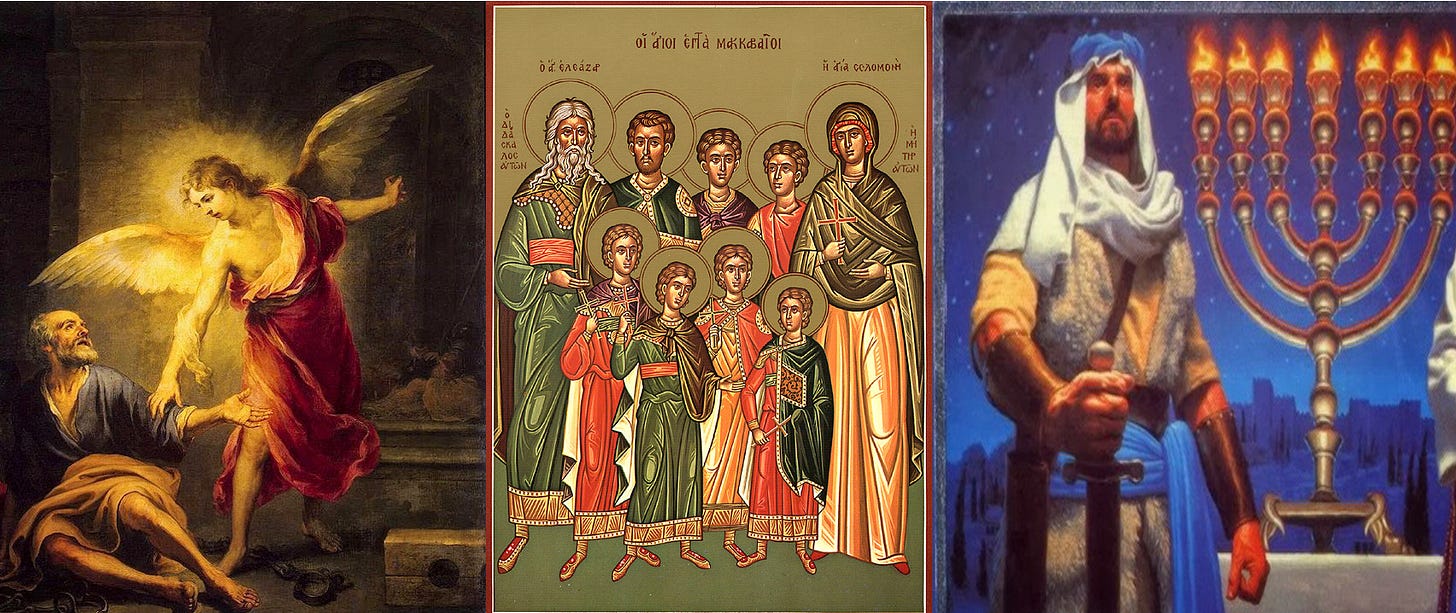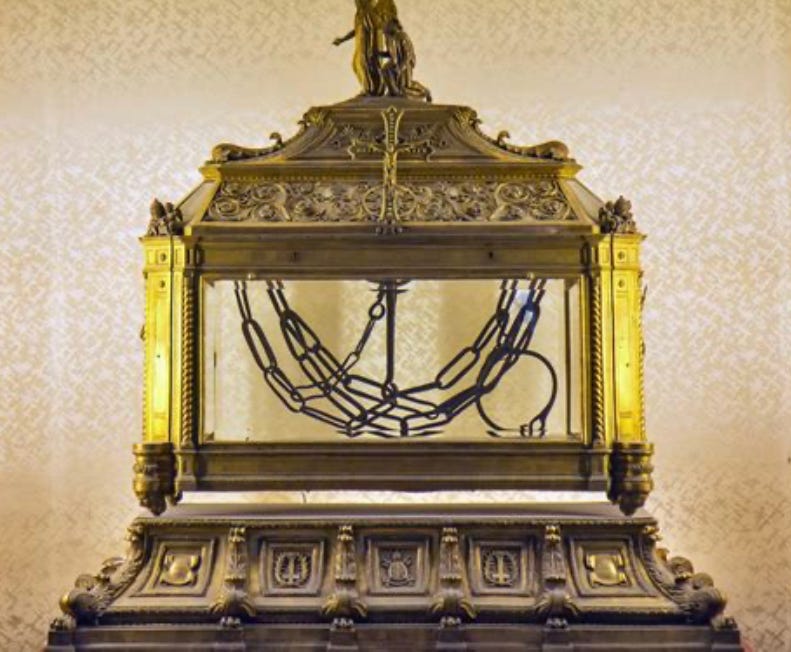Today in the Catholic Church we commemorate heroes of the Old and New Testaments of the Bible. The Holy Maccabees stayed faithful to Judaism under persecution and eventually drove their pagan oppressors from their land. Meanwhile, St. Peter was miraculously freed from prison by an angel after “prayer was made without ceasing by the church unto God for him.” (Acts 12:5)
King Herod killed the Apostle James the Greater, and arrested Peter, the head of the Church, intending to kill him too. Below is the story of Peter’s miraculous deliverance from prison (Acts 12:6-11):
“[Catholicesaints.info] Peter was sleeping between two soldiers, bound with two chains: and the keepers before the door kept the prison. And behold an angel of the Lord stood by him: and a light shined in the room: and he striking Peter on the side, raised him up, saying: Arise quickly. And the chains fell off from his hands. And the angel said to him: Gird thyself, and put on thy sandals. And he did so. And he said to him: Cast thy garment about thee, and follow me. And going out, he followed him, and he knew not that it was true which was done by the angel: but thought he saw a vision. And passing through the first and the second ward, they came to the iron gate that leadeth to the city, which of itself opened to them. And going out, they passed on through one street: and immediately the angel departed from him.
And Peter coming to himself, said: Now I know in very deed, that the Lord hath sent his angel, and hath delivered me out of the hand of Herod.”
The chains that are said to have bound Peter in the Biblical story have been preserved, and are still displayed in the church of St. Peter in Chains in Rome, where I had the privilege of seeing them. They are a physical reminder of what the apostles suffered for Christ, but also of how faith can work miracles.
Today is also the feast of the Holy Maccabees, as said above. This feast commemorates the martyrs and military and religious leaders described in the Old Testament books of the Maccabees, which are still included in the Catholic canon of Scripture, though they have since been removed by the Protestants and Jews. The Maccabees books detail a pagan persecution of the Jews, and the rise of the last dynasty of an independent ancient Israel (the Maccabees).
“Jewish dynasty which began with the rebellion of Mathathias and his five sons against the Syrian king, Antiochus IV (168 BC) and ruled the fortunes of Israel until the advent of Herod the Great. Syrian attempts to force Greek paganism on the Jews, the profanation of the Temple at Jerusalem, and the massacre which followed, brought the nation to arms under Mathathias, a priest of the sons of Joarib. At the death of Mathathias, Judas Machabeus, his third son, drove the Syrians and Hellenists out of Jerusalem, rededicated the Temple, and began an offensive and defensive alliance with the Romans. Before the treaty was concluded, however, Judas, with 800 men, risked battle at Laisa with an overwhelming army of Syrians under Bacchides, and was slain. He was succeeded in command by his youngest brother, Jonathan (161 BC). Jonathan defeated Bacchides, revenged the death of his brother, and made peace with Alexander who had usurped the throne of Demetrius, the successor to Antiochus. A period of peace followed in which Jonathan ruled as high priest in Jerusalem, but Tryphon, who was plotting for the throne of Asia, treacherously captured him at ptolemais and later put him to death. The captaincy of the armies of Israel then fell to Simon, the second son of Mathathias. Under him the land of Juda flourished exceedingly. He obtained the complete independence of the country and a grateful people bestowed upon him the hereditary kingship of the nation. His rule marked five years of uninterrupted peace. He was treacherously slain by his son-in-law, Ptolemy, about the year 135 BC After Simon the race of the Machabees quickly degenerated. In 63 BC the Romans thought it necessary to interfere in the fratricidal war between Hyrcanus II and Aristobulus II. With this interference and the advent of Herod the Great the scepter passed forever from the land of Juda. The story of the Machabees is written in the two books of the Old Testament which bear that name.”
There are many religious concepts emerging in the books of the Maccabees that come to fruition in Christianity, such as belief in a resurrection of the dead (2 Mac. 7:9) and when Judas Maccabaeus says, “It is therefore a holy and wholesome thought to pray for the dead, that they may be loosed from sins.” (2 Mac. 12:46)
The Maccabees’ feast also commemorates Eleazar the scribe and Solomonia and her sons:
“[ECPubs] The holy seven Maccabees, their mother Solomonia, and the elder Eleazar at Antioch in Syria, under Antiochus Epiphanes the king. For the sake of keeping the law of the Lord with unconquered faith, they were cruelly handed over to death with their mother. She suffered with her sons as they were martyred, one by one, and was crowned with them, as it is written in the second book of the Maccabees [2 Mac. 7]. Likewise is commemorated St. Eleazar, one of the first scribes, a man of advanced age. In that same persecution, refusing to eat forbidden meat on account of his love for the Torah of the Lord, he achieved a most glorious death rather than a shameful life; he voluntarily went to his punishment, leaving an excellent example of virtue.”
Whether we are called to face only ordinary trials, to endure torture and death, or to be saved miraculously from some danger, we must always keep God at the center of our lives. The Jewish and Christian heroes we commemorate today were not only willing but rejoiced to suffer for Christ, because Christ suffered for them. That is the heroism that merits Heaven.






Sadly, protestants mostly have no idea of the Maccabees.